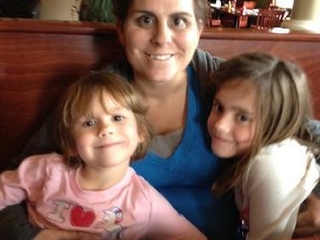July 12, 2012 -- Until recently, Danni Cote Gilbert kept a pretty low profile. She teaches high school social studies and psychology in Mountain Home, Idaho, a town 40 miles east of Boise with a population of 12,266. Her husband, James, is an administrator in the Mountain Home School District, and they have two daughters, aged five and seven.
 Now Gilbert is the subject of a petition on the social activism website Change.org, which has gathered more than 98,000 signatures on her behalf after just two and a half weeks.
Now Gilbert is the subject of a petition on the social activism website Change.org, which has gathered more than 98,000 signatures on her behalf after just two and a half weeks.
Gilbert, who’s been battling Stage IV metastatic colon for nearly two years, has had multiple rounds of chemotherapy and a course of radiation.
After attending the American Society of Clinical Oncology meeting last month, Gilbert’s oncologist, Dr. Dan Zuckerman with the Mountain States Tumor Institute – heard about a paper touting Avastin for second-line treatment of metastatic colorectal cancer – and recommended that Gilbert start taking Avastin in conjunction with a second line of chemotherapy.
While Blue Cross Idaho had paid for Avastin treatment in the past, it has denied a claim for continued coverage of the drug.
Joshua Jordan, corporate communication director for the insurer, told the insurer could not comment on the specifics of Gilbert's situation, but said, "We will provide coverage for Avastin as a first or second level treatment for cancer patients."
Initially the insurer refused to pay for any of Gilbert’s treatment, which would have meant the Gilberts would have been responsible for $11,000 in medical costs every two weeks. Then Blue Cross relented, saying they would pay for everything except Avastin, which would cost Gilbert about $3,000 per biweekly treatment. (See update below: Blue Cross said it did deny an initial claim for a second-line treatment involving Avastin, but then only denied coverage for Avastin itself and has continued to provide coverage for Gilbert's care outside of the most recent Avastin claim.)
According to the petition, Blue Cross had its most profitable year in history last year, its net earnings growing from $12 million to $57 million.
Zuckerman has also rallied behind Gilbert, writing an appeal letter to Blue Cross, which was unsuccessful.
“Danni's fighting for her life,” Zuckerman said. “It's my job to help her live as long as possible, and there is definitely evidence that by doing this we're going to help her live as long as possible. It is evidence based, so it should be covered.”
Gilbert has also gotten in touch with the Patient Advocate Foundation through a patient advocate at St. Luke's Hospital in Boise, who assisted her with writing her own appeal.
As her struggle became more public, Gilbert said Karen Early, director of communication for Blue Cross, contacted Gilbert, saying the company was concerned about the bad publicity and what she called misinformation, but would not comment on her case because Gilbert hadn’t signed a confidentiality waiver.
Gilbert said she faxed over the waiver Monday but as of Tuesday afternoon the insurer hadn’t received it, Jordan said.
Throughout her treatment, Gilbert has told doctors she doesn't want information about her prognosis, including the likelihood of survival or the number of months or years she has left.
“It's counterproductive. I don't want to know it. I just want to enjoy the time that I have, and do what my doctor says,” Gilbert said, adding that she resents that the denial and appeal process has brought her face to face with the grim survival statistics for someone whose cancer has progressed so far – when all she wants to do is focus on her treatment and spend as much time with her daughters as she can.
“At this point, I'm just so sick of dealing with it when I should be focusing on my health. They deny you, and hope you don't pursue it,” Gilbert said. “It's very eye opening, and depressing, too, and just infuriating.”
UPDATE, 7/13/12: Following the publication of this story Thursday, Blue Cross Idaho contacted The Lund Report to say they had received Gilbert's HIPAA waiver and requested the opportunity to provide additional comment on her case. Early said the insurer did not refuse to pay for the totality of Gilbert's coverage. Instead, it said it rejected a claim for a second-line treatment plan that included Avastin, and as soon as Zuckerman submitted a claim for a second-line treatment that did not include Avastin, they approved the claim, as the insurer disagrees with Zuckerman's statement that this use of the drug is evidence-based. Early also said Gilbert was offered the opportunity to submit an external appeal through the Idaho Department of Insurance, which would appoint an independent group of physicians to review her case, and that Gilbert has not taken the insurer up on this offer. The text of this story has been altered to clarify details about the initial denial, and to clarify that the information about Gilbert's conversations with Early were relayed to The Lund Report by Gilbert.